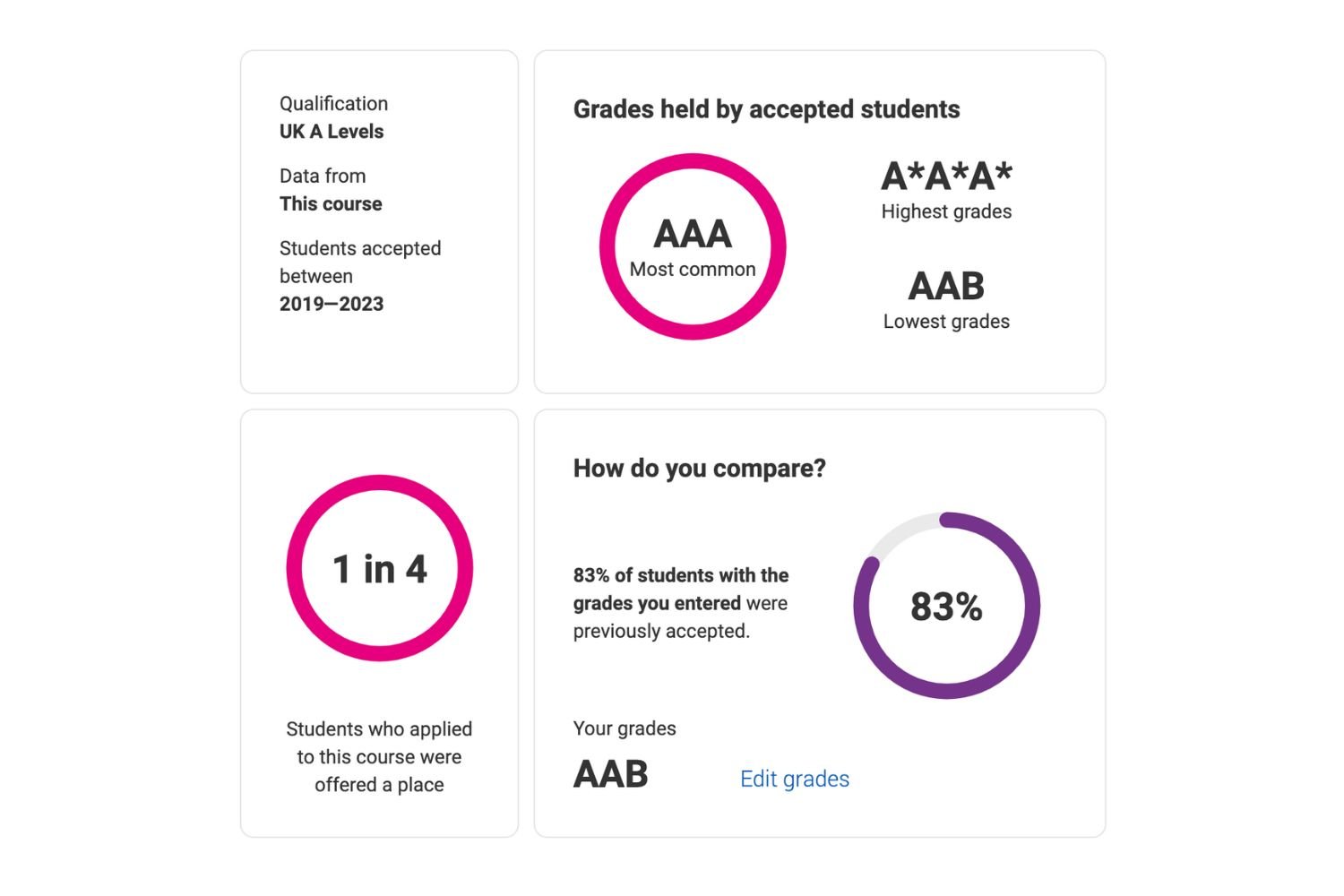Newsletter
Ideas, insight and inspiration. Direct to your inbox on Tuesdays.
Previous newsletters

UCAS historical entry grades data, Frequently Asked Questions, and doing your best with what you know.
This week we look at a hugely significant new initiative by UCAS to help demystify entry grades for applicants: known as “Entry Grades Data (Beta)”.
Secondly, you know when you have a question about the UCAS process that you just can’t see the answer to in the standard information? Turns out the answers might be easier to find than you think!
And finally, we learn a bit about just doing your best.

Crazy university jargon, the Jumpstart university, and the biggest problem in communication.
This week we attempt to demystify some of the crazy jargon used in university degree descriptions.
We hear about Jumpstart University, a fantastic resource to help you prepare for your studies at university.
And we learn about the single biggest problem in communication.

Building your super-skills, support for estranged students, and taking the impossible leap.
This week we look at the importance of building universal transferable skills while at university, and why you really want to find your specific super-skills.
We look at some great resources for estranged students.
And we discover the truth about taking the impossible leap.

Building slack into your life, understanding your student loan, and the antidote to anxiety.
This week we look at something super-important for all of you who are heading into your last term at school: building a little slack into your life!
We look at the very best explainer of that most complex of topics: how your student loan actually works.
And we finish with action, the antidote to anxiety.

Something very special to help you with your UCAS Personal Statement
Hi everyone, and welcome to a slightly different edition of #betterunichoices.
Over the last month or so I’ve been working hard on a whole suite of new materials, so instead of the usual format, this week I’d like to tell you all about my new online course, Podcast and written guide; all designed to help you to write your UCAS Personal Statement.

University admissions tests, Edinburgh video diaries, plus the importance of actions and feelings.
This week we have a close look at university admissions tests, to make sure you know everything you need to know about the tests you might need to take if you are applying to university next year.
We also check out some amazing video diaries from two students at the University of Edinburgh.
And we find out the importance of both actions and feelings, and why one without the other can be a problem!

Applying for accommodation, Geoff Norcott, the confusion of foundation courses, and the definition of happiness.
This week we have a look at all the different options for accommodation as you head off to university, including guarantees and application deadlines.
We try to break down some of the complications and misunderstandings around foundation courses.
And we hear a very wise man’s definition of happiness.

Budgeting at university, last minute problems, and three types of decision.
After last week’s introduction to fees, loans and grants, this week we look at how to budget and how to manage your money while at university.
We consider one very good reason why you should never, ever leave applications of any type to the last minute.
And we learn about hats, haircuts and tattoos, and what they can teach you about decision making.

Student finance basics, UCAS Discovery, and humankind's greatest achievement.
This week we make an abrupt 180 degree turn, from last week’s ancient Roman philosophy, to one of the most critical and practical challenges for all students: understanding student finance.
We find out about UCAS Discovery Exhibitions, which start this week.
And we learn why education should not be seen merely as a hoop for you to jump through.

Resilience and stoicism, taking an EPQ, and developing a passion for learning.
This week we follow up last month's article about career happiness, with a look at two more critical aspects of happiness: resilience and stoicism.
We also look at the impact of taking an EPQ on admissions.
And we hear about what happens if you develop a passion for learning.

Crazy competitive courses, UCAS Extra, and thinking like a Roman Emperor.
This week we look at why some universities are so ridiculously hard to get into. Spoiler; it’s not about how hard the course is.
We remind ourselves that UCAS Extra opens very soon!
And we are introduced to some stoic thinking by a Roman Emperor.

UCAS Extra and Clearing, Student Finance, and the truth about prestige.
This week we take a look at UCAS Extra and Clearing, both of which could be really important options for you if things don’t go quite as you expect.
We also take a first look at university funding for UK students.
And we hear about prestige and how it can warp your beliefs.

Your final UCAS choices, preparing for university, and making life-size decisions.
This week we look at how to make your final UCAS decisions, narrowing your choices from five, to two universities.
We look at two excellent resources to help you prepare for your big move to university.
And we look at a simple model for making life-size decisions: just be happy, smart and useful!

Career happiness, bad treatment by universities, and a little gem from Hugh Laurie.
This week we look at parental pressure and what this has to do with your career happiness.
We also look at what to do if a university treats you badly during the admissions process.
And we hear a gem of an idea from actor Hugh Lawrie.

University branding, the real UCAS deadline, and what education is actually for.
This week we look at something a bit off-beat: university branding.
Now I’m very aware that in 25 years of working in universities I’ve never had a single student show the remotest interest in university branding.
But that’s what makes this newsletter a bit different, right? Because if you want to find a university that matches your values, and fits your personality, there is 100% something to learn from the way universities brand themselves.
We also learn a super-important fact about the UCAS deadline.
And we hear an interesting philosophical take on what education is really for.

Are university rankings helpful? And two ideas to help you spend 80,000 hours on the right thing.
This week we look closely at university rankings and league tables. What are they? What do people in the sector think about them? And are they of any help to you?
We also look at an amazing website that can help you work out how to make a real difference in your career.
And the penny drops on an unbelievably simple, but massively important idea about choosing a career and a course.

Are you a driver, or a passenger? Pressure selling. And a thought from Banksy.
This week we have a look at who is actually driving your university choices, and ask four questions which will help keep you honest.
We have a look at why ‘pressure selling’ by universities is not OK.
And we hear from Banksy on taking initiative.

A growth mindset, Uniscoops, and the benefits of looking for doubt.
This week we learn all about what it means to have a growth mindset, and how it really is critical as you learn and develop.
We hear about Uniscoops, a rather wonderful initiative from a couple of Oxford students.
And we hear some pretty challenging advice from Mark Manson, author of “The Subtle Art of not giving a F*ck”.

Studying smarter not harder, knowing your fee status, and why it’s not always best to be the smartest person in the room.
This week, we look at three techniques that can help you study smarter, but not harder, for your mock exams.
We look at a super useful website for those unsure of their tuition fee status.
And we find out why it is not normally a good idea to be the smartest person in the room.

Applicant visit days, understanding that universities are only human, and learning from the mistakes of others.
This week we look at UCAS Applicant Visit Days; how they differ from Open Days, and how to make the very best of your visit.
We also have a look at what to do if there seems to be an error in your admissions offer.
And we find out that sometimes making our own mistakes isn’t the only way to learn.
